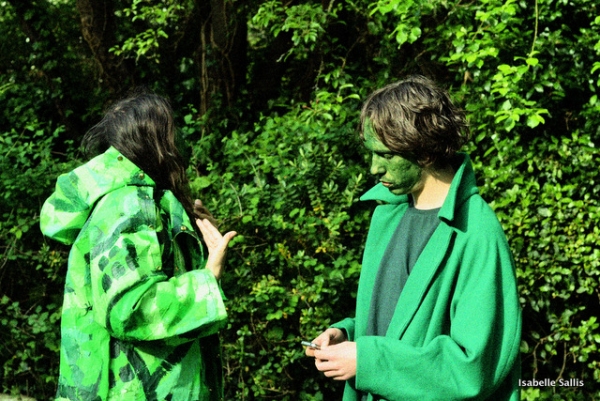
The Sound of Bristol: Giant Swan
Posted on: 13 Jan 20172017's first instalment of The Sound of Bristol sees Giant Swan land in the 365Bristol office, with the experimental dance duo and one half of The Naturals taking us through their musical development.
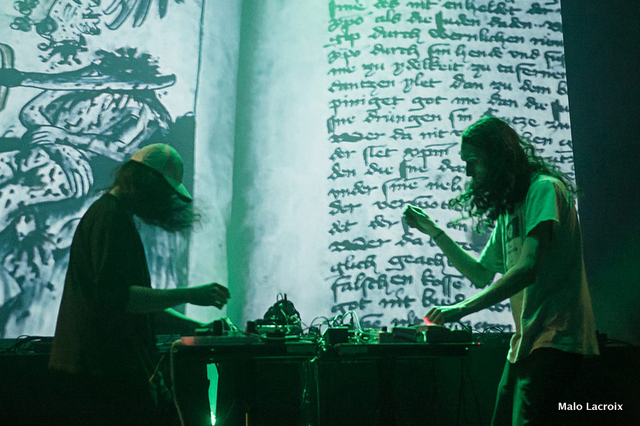
It is interesting, perhaps even surprising, to hear that the word ‘inclusivity’ is central to the ethos of Giant Swan, given that the duo represents something of a splinter group. The pair, formed of Robin Stewart and Harry Wright, comprise the guitar wing of experimental outfit and local heroes The Naturals, but began the side-project to allow an outlet for their electronic tendencies.
“Now as Giant Swan we make inclusive, rhythm-laden tracks, but the whole thing originated as a vehicle for me and Rob to jam out ideas and work with our pedals and our equipment, which we would then bring to The Naturals,” begins the latter, eagerly. “Giant Swan means that Rob and I are able to get other influences out without it affecting The Naturals, where before we had been filtering it a bit. So with Giant Swan came a channel for the dance music we wanted to put out.”
“We wanted to expand our horizons without upsetting anybody,” agrees Robin, who hides his wild mane of hair beneath a red beanie. “Subconsciously I think we were always trying to avoid working in the same way as we did in the band, and now its turned into a much different thing all on its own. But the headspace has always been the same and we’ve had to do three years on a circuit to realise that our aims haven’t changed. If anything they’ve just been reinforced.”
As a result of the blurred lined between the two musical projects, it is difficult to pinpoint an exact date of genesis, though Giant Swan properly took flight three years ago following incubating encouragement from a friend: “It was Amos, from Young Echo, who encouraged us to play live together for the first time and from that it spawned properly,” explains Harry. “But because we never really had this beginning point as we had always played with each other, it was just an extension of a pre-existing relationship.”
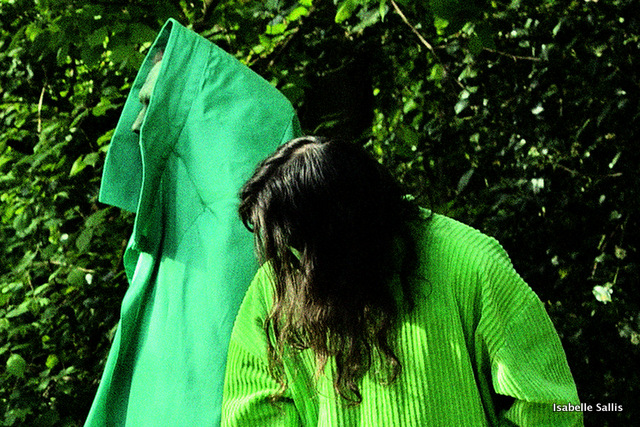
“One of the luckiest things about me being in Giant Swan is that I was in it with somebody that I didn’t have to get to know,” Robin chips in. “It made us better mates as well, it’s a cool way to spend time. We still do the same stuff that we did then; so we’ll spend half a day or half a night making tunes, or talking, chilling out, whatever. It’s like going to the pub to watch the football, but we…”
“We watch each other!” concludes his partner in crime, with a facetious chime of melodramatic infatuation in his voice, before both break out into peels of infectious laughter.
The runaway back-and-forth between the pair comes to a sustained halt, however, when the question is put to them of what Giant Swan actually sounds like. This, perhaps, isn’t surprising: the task of describing the noise that they make has continually perplexed critics and fans alike, with more and more outlandish similes being offered up in attempt. LICE singer Alastair Shuttleworth, in his documentary about Howling Owl, may have come closest in his likening their music to the sound of ‘a dog made out of metal being hit by a train.’
After a prolonged period of chin-scratching, Robin concedes, “It’s a very drum-heavy energy. A lot of ideas are put through one filter which comes out in a very intense delivery. We want it to be very inclusive, so in that we try to encompass it being really bangin’ and really able to make you move with lots of very physical sonics, but it’s flexible within that so you can behave how you want.”
He is very careful to eschew heavy-handed labels though, and the suggestion that Giant Swan’s output might fall under the remit of ‘techno’ is dismissed out of hand: “It’s not just ‘dance music’, you can react to it in any way you want. We feed off a lot of different music to get there but it is very energetic.”
If ‘techno’ it is not, ‘energetic’ it absolutely is: Giant Swan shows consist of Harry and Robin facing each other across a chest-high barricade of drum-machines and guitar pedals, behind which they writhe like epileptic Neanderthals in a frenzy of sweat and hair. Looping Robin’s yelps and screams into a sprawling drone, they draw out hour-long sets of improvised musical intensity.
Pursuing this formula, Giant Swan never play the same set twice, and it is the unpredictability of their live performance which allows it remain continually enjoyable to perform and fascinating to behold: “We usually have an idea of where we want to end up, or of certain places that we want to go to within the set, but it’s the how we get to these points that changes,” Harry explains. “And that can all depend on how we’re feeling, the vibe in the room, how late it is; but that’s the stuff that keeps it fun and spontaneous. Since Giant Swan has always been about improvisation and jamming, we’re trying to bring that level of improvisation and elasticity to a music form that is very rigid.”
Speaking about their live shows, Harry returns to that inclusive intent, a pursuit which sees them attempt to break the barrier between themselves and their audience. “The inclusivity of our music is something that doesn’t get mentioned as much within the gigs we play,” he begins. “Some of them are very serious techno shows and club nights and there’s a lot of very serious people with their heads up at the back - and we want to get rid of that. We want everyone to be able to lose their shit and dance - we want people to let go of their inhibitions. We want everyone to react how they want to, that’s why we get really into it as well.”
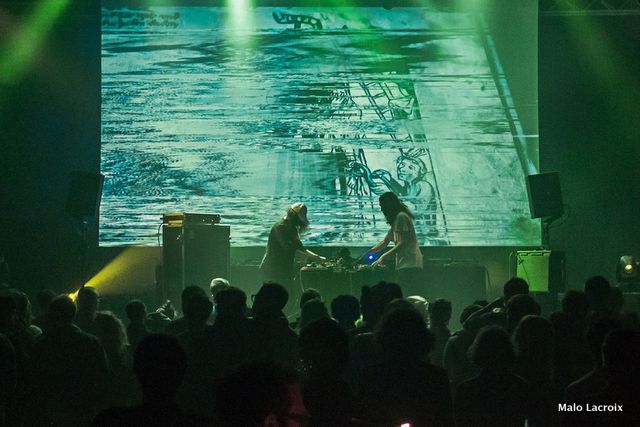
He goes on, “If we’re hearing it through new sound systems, it’s like hearing new tunes for the first time, which puts us on exactly the same level as the audience and breaking the fourth wall so that we’re all hearing something for the first time together.”
This parity that they establish between themselves and their audience is a facet of the duo’s ability to remain grounded and to remember that they themselves were once faces in the crowd. “We’re are doing the exact same thing as we would in audience,” Robin concurs. “We came into this world as listeners and going to raves was about doing that improvisation process in your head, when you lose yourself. We make the same music that we would want to hear in an audience, pinging our nuts off: 'music to move your jaw to' - we should put that on a t-shirt!”
More than just a bit of cardio though, Giant Swan’s onstage movement is a conscious two fingers to the entitlement which seeps into much of DJ culture and which they think it important to call out as they have taken tentative steps into it. “A lot of people fetishize the role of the DJ and of that position on the other side of the barrier, which has inevitably engendered arrogance in their expectance of the crowd to provide the vibe and the feel,” he continues. “We feel that the person who’s making the music should be providing that. For it to be at all fulfilling for Harry and me, that spark has to come from us.”
Another aspect that sets the duo at odds to the techno DJs they have begun to appear alongside is their equipment, which, Robin says, “Really started to stand out when we started playing bigger shows with higher specs.” He goes on, “There’s an argument to say that if you’ve got better equipment you can make better music, but we think that you’ve got to get better with what you’ve got.”
“It comes down to that inclusive thing again,” Harry chips in, “we want to make music that isn’t for the gear-heads. We’ve had shows where people are crowding round and looking over our shoulders, and they’re either disappointed to see that we’re not using some super-rare bit of kit, or they’re fascinated to see that we’ve been able to get such a great sound out of the stuff we’re using. It has a more positive message. I don’t think our music is specific to our gear, we could use anything really.”
This DIY mentality of making-do is one which they share with lots of other musicians who operate in Bristol at the moment, with bands like IDLES, Spectres and Cousin Kula responsible for the great deal of excitement bubbling around the city’s musical output at present. But with its musical history (or, a version which extends as far as Massive Attack, Tricky and Portishead) having been documented to death, the idea of a ‘Bristol scene’ or, worse, a ‘Bristol sound’ sits awkwardly with these boys.
“There is a musical heritage here, but that doesn’t mean that the musicians working here are trying to make music that ‘sounds like’ Bristol,” Robin begins. “It’s a place where a 16 year old white kid from Southmead put on a grime night and 10 years later he’s Neek, or we have a sound system culture that has been propped up by the boys from Massive Attack. But there isn’t a collection of bands and artists trying to just sound like one of those guys.”
“The city has obviously helped the artists who live in it, but it doesn’t get a mention in the music,” Harry nods. “But because we’re lucky enough to live here we can go see a thousand things in a month that are all completely different, and its that variety which informs the sound.”
“In terms of a musical scene or a cliquey scene, I’d be hesitant to say because its much broader than that. I think there is a scene in Bristol in that there’s a hub and a community of music where everyone is open to hearing new stuff and there’s lots of different crossovers of genres, which I’d like to think that we are a part of,” he posits, with an air of decision. “We make music with people like Oliver Wilde and Tamu Massif, but also people like Ossia, Silver Waves and the guys from Young Echo; we’re just lucky enough to all be friends really.”
And with that, Harry Wright may have just put his finger on it: a scene based not on a cohesive genre, but on the overarching cooperative ehthos which links its musically-different members. As such, we are able to end where we began, with the celebration of inclusivity.
Article by:
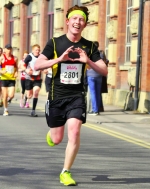
An ardent Geordie minus the accent, Sam seemingly strove to get as far away from the Toon as possible, as soon as university beckoned. Three undergraduate years at UoB were more than ample time for Bristol (as it inevitably does) to get under his skin, and so here he remains: reporting, as Assistant Editor, on the cultural happenings which so infatuated him with the city. Catch him at sam@365bristol.com.

